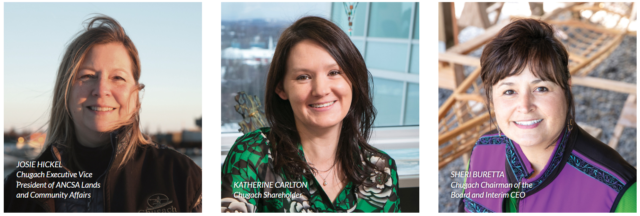
Both milestones—becoming a mother and being elected as the only female board member at the time—represent significant points of pride for Buretta. They also reflect the multi-faceted gender and cultural identities that shape Alaska Native women in leadership roles today.
“Historically, Alaska Native women have played vital roles in shaping, defending, and strengthening their families and communities, and these traditional values translated to many of the same leadership skills that were necessary to thrive in the business world after the Alaska Native Claims Settlement Act [ANCSA] was enacted,” explains fellow shareholder and Chugach President Josie Hickel. “Sheri brings the same strength, resolve, passion, and compassion to her work as she does to her community involvement and family.”
Both Buretta and Hickel are among the many Indigenous women serving in key leadership positions for Alaska Native Corporations (ANCs). They also reflect broader trends that show Alaska Native women collectively outpacing national gender equality statistics.
“Many countries and corporations today are setting their sights on gender diversity goals that are already happening relatively organically within Alaska Native Corporations and Native organizations at large,” explains ANCSA Regional Association Executive Director Kim Reitmeier.
In the United States in 2019, women represented just 21 percent of C-Suite positions, and women of color represented a mere 4 percent.Meanwhile, progress towards gender parity in ANC leadership roles is more promising. Five out of the twelve (42 percent) Presidents and CEOs at the helm of ANCs (as represented on the ARA Board of Directors) are women. At Chugach, five out of nine (55 percent) Chugach board members are women, while seven out of eleven (64 percent) of its executive team members are women.
Today, there is also a robust network of women across the state leading Alaska Native organizations, including Kim Reitmeier at the ANCSA Regional Association; Julie Kitka at the Alaska Federation of Natives; Hallie Bissett at the Alaska Native Village Corporation Association; and Emily Edenshaw at the Alaska Native Heritage Center, among others.
Many Indigenous tribes had matrilineal social systems, which may explain the strong data across Native organizations as a whole. According to the National Congress of American Indians 2015 report, the number of businesses owned by Native American and Alaska Native women has more than doubled since 1997, and women now represent 47 percent of Native owned companies. Nearly 25 percent of federally recognized tribes are led by women, which is higher than state leadership nationwide, with only 12 percent of the fifty states having female governors.
Yet another core tenet of many tribes is the communal governance structure, which places community over the individual. “One of the guiding ethos of our organization and our people is reciprocity,” explains Buretta. “We believe that today’s Alaska Native leaders have a responsibility to pass their knowledge, experience, and traditions on to the next generation of women and to create opportunities for them. Mary Gordaoff, Chugach’s only female founder, was just one of the many trailblazers who laid this foundation fifty years ago, and that vision to empower women to fill crucial leadership roles continues today.”
Higher education is certainly a major factor in breaking down gender barriers. American Indian/Alaska Native women enrollment in colleges and universities nationwide increased nearly 200 percent between 1976 and 2006. Chugach and other ANCs invest heavily in scholarship, training, and development programs, which are critical stepping stones towards leadership positions.
To date, Alaska Native education foundations, including Chugach Heritage Foundation (CHF), have awarded more than 54,000 individual scholarships to shareholders and descendants, totaling more than $100 million for Alaska Natives to pursue higher education goals and vocational endeavors.
Chugach’s board believes education is the key to empowering shareholders and invested $36 million in the CHF Endowment Fund, which provides a perpetual source of funding for CHF scholarship and cultural programs.
Chugach shareholder Katherine Carlton is just one of the beneficiaries of these programs. She was awarded a scholarship from Chugach to earn her bachelor’s degree and to graduate from the Alaska Native Executive Leadership Program. She was appointed as Assistant to the Chugach Government Solutions President, Chugach’s largest federal government contracting arm. Today, she serves as President of one of its subsidiaries, Chugach Education Services, Inc. More importantly, she is a visible success story to other female shareholders looking to shatter the glass ceiling.
“Federal government contracting is traditionally a male-dominated industry, and although that dynamic is shifting, it’s still not uncommon to be the only woman at the table,” says Carlton. “My education and experience through Chugach have given me the confidence and tools I need to succeed. More importantly, I have both mentors and colleagues who recognize the value I bring to the table and have played an important hand in my development.”
Today, Carlton is paying it forward as co-chair of the Chugach Native Professionals Group, which strives to educate and empower shareholders and descendants employed with Chugach.
Keeping the female leadership pipeline flowing through the pandemic presented a unique set of challenges, as mothers balanced their children’s remote schooling with their own work.
“As a mother and grandmother, it’s remarkable to see corporations like Chugach step up to support employees during the pandemic, at a time when many women felt pressured to ‘downsize’ their careers or leave the workforce altogether,” says Hickel. “Having women at the table means those leadership conversations are brought to the forefront and ensures that we’re addressing needs for balance and flexibility.”
The journey is not over. There is still much to overcome. But thanks to Indigenous female leaders, we’re taking steps towards living in a fairer and more equitable world.


